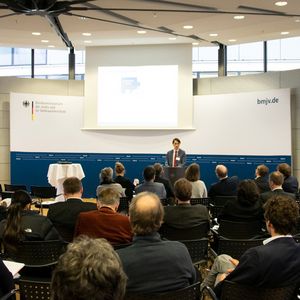Data are the engine of the digital transformation. They are at the center of new business models, they feed the development of artificial intelligence and enable innovation.
In the digital era undertakings, consumers and the state depend on access to data controlled by others in many contexts. The need and justification for new data access rules, as well as the question of how they should be designed, not only present new challenges for political decision-makers – both at national and EU level – but have recently also gained more attention in legal scholarship.
It was therefore the aim of the Consumer Rights Days 2019 to bring together representatives from scholarship and politics to discuss the future of data access regimes. The Max Planck Institute for Innovation and Competition, under the leadership of its Director Josef Drexl, was in charge of organizing the academic side of the two-day conference hosted at the Federal Ministry of Justice and Consumer Protection. Through presentations, keynotes and a panel discussion, participants considered how access to data in the digital era should be designed to promote innovation and competition while ensuring that privacy interests and trade secrets are adequately protected. The event highlighted the issue of data access not only from the perspective of competition policy but also with a particular focus on public interest grounds and consumer interests.
The keynote on the first day of the conference was given by Professor Christiane Wendehorst. As Co-Speaker for the Federal Government's Data Ethics Commission, she explained the most important results of the Commission's work. In the keynote on the second day, Malte Beyer-Katzenberger from the European Commission provided an idea of what kind of initiatives to promote access to data are to be expected from the Commission. Representing the Max Planck Institute for Innovation and Competition, Professor Josef Drexl spoke on the potential introduction of data access claims of users regarding data generated by smart products. Jörg Hoffmann evaluated the potential of existing and future sector-specific access claims of competitors, and Heiko Richter discussed rules enabling the state to access private sector data based on public interest grounds.
The contributions to the conference are expected to be published in an edited volume before the end of 2020. Not least, the potential political impact of the conference has to be assessed against the backdrop that Germany will take over the Presidency of the Council of the EU in the second half of 2020. There is no doubt about the significance the goal of enhanced data access now has for the German government. "We are committed to improving access to data, and with the Consumer Rights Days public interest grounds and consumer interests move to the center of the debate. Yet, it will remain essential that the protection of the rights of every individual is equally guaranteed ", said State Secretary Gerd Billen at the close of the conference.
Find a detailed Summary of the Conumer Rights Days (in German) here.

